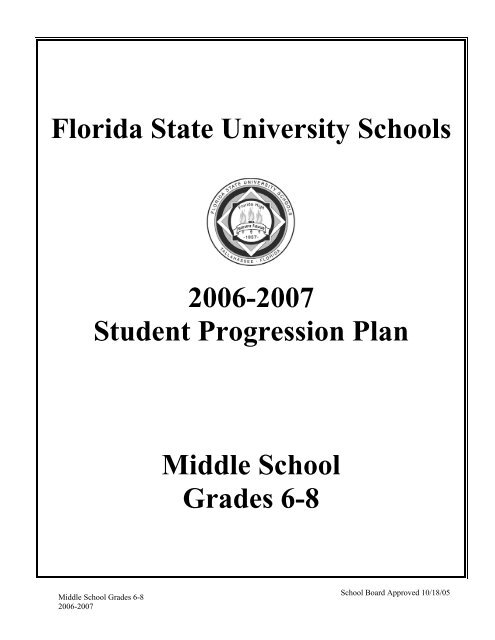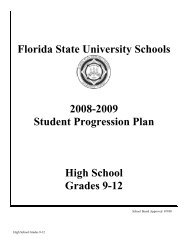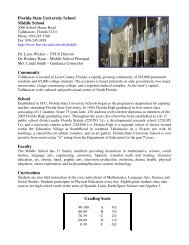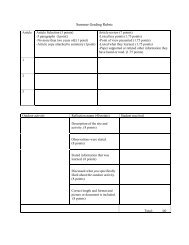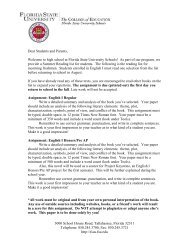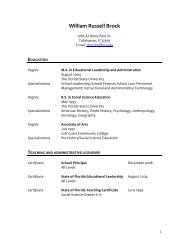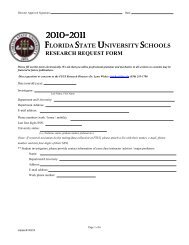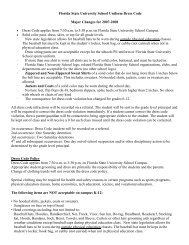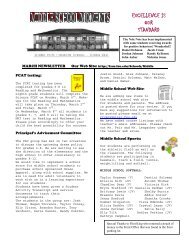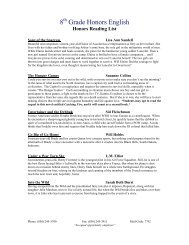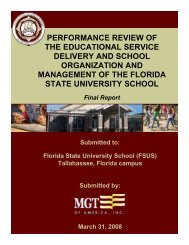Florida State University Schools 2006-2007 Student Progression ...
Florida State University Schools 2006-2007 Student Progression ...
Florida State University Schools 2006-2007 Student Progression ...
You also want an ePaper? Increase the reach of your titles
YUMPU automatically turns print PDFs into web optimized ePapers that Google loves.
<strong>Florida</strong> <strong>State</strong> <strong>University</strong> <strong>Schools</strong><br />
Middle School Grades 6-8<br />
<strong>2006</strong>-<strong>2007</strong><br />
<strong>2006</strong>-<strong>2007</strong><br />
<strong>Student</strong> <strong>Progression</strong> Plan<br />
Middle School<br />
Grades 6-8<br />
School Board Approved 10/18/05
Middle School Grades 6-8<br />
<strong>2006</strong>-<strong>2007</strong><br />
MIDDLE SCHOOL<br />
(GRADES 6 – 8)<br />
STUDENT PROGRESSION PLAN<br />
The curriculum, instruction and assessment system of the District School Board is<br />
aligned with the <strong>Florida</strong> <strong>State</strong> Education Goals and Standards and the Sunshine <strong>State</strong> Standards<br />
(curriculum frameworks). The Middle School will offer courses of study and instruction that reflect the<br />
1996 Sunshine <strong>State</strong> Standards in Pre-K – 12: language arts, mathematics, science, social studies,<br />
foreign languages, health and physical education, and the arts. Instruction will address the skills and<br />
competencies that a student must learn in order to graduate from high school. (F.S. 1008.25)<br />
The student performance standards must address the skills and competencies that a student must learn<br />
in order to graduate from high school. (SBR 6A-109401 FAC) A career and academic plan will be<br />
initiated for each eighth grade student and shall be reviewed and revised throughout high school.<br />
The Middle School will offer instruction for limited English proficient students which complies with<br />
the 1990 LULAC/META Consent Decree and with the District LEP Plan which is both approved<br />
by the District School Board and the <strong>Florida</strong> <strong>State</strong> Department of Education.<br />
Note: No student will be denied appropriate use of his/her primary language. (FS 233.058,SBR<br />
6A.6.0908(3) FAC).<br />
Each student must participate in statewide assessment tests at designated grade levels, as required by<br />
F.S. 1008.25(4).<br />
<strong>Student</strong> Placement: Promotion, Retention, and Promotion with Instructional Support<br />
• <strong>Student</strong> promotion in grades 6-8 is based on locally determined assessment and, where<br />
appropriate or mandated, statewide assessment. No one test with single administration should<br />
determine promotion or retention. The preponderance of evidence from evaluations should<br />
be used to determine if a student is ready for the work of the next grade. (F.S. 1008.25)<br />
• Under most circumstances, a student may be retained only once in middle school (grades 6-8);<br />
however, on the recommendation of the principal and with the approval of the Director's Staff,<br />
a student may be retained a second time in 6-8 if, after remediation, the student continues to<br />
perform below the district identified minimum levels of performance, and there is not good cause<br />
for promotion to the next grade. The recommendation for the second retention must be reviewed<br />
by the SIT Team (F.S. 1008.25). No student may be retained solely due to English language proficiency.<br />
• “No promotion or retention decision may be made for any individual student classified<br />
as LEP based solely on a score on any single assessment instrument, whether such assessment instrument<br />
is part of the statewide assessment program or of a particular district’s formal assessment process.<br />
A formal retention recommendation regarding a LEP student may be made through action of a LEP<br />
committee.” (FS 1003.56)<br />
• Any student whose overall performance suggests he/she would benefit from instruction<br />
at the next grade level based on factors outlined in this document may upon<br />
2
ecommendation of the principal be promoted with instructional support. In all cases<br />
the student’s cumulative record must have “promoted with instructional support”<br />
written on it. In no case shall this decision be based on age or on the basis of social<br />
factors. Since it is the intent that the next grade offers intensive intervention, the<br />
student must have an AIP developed that addresses those intensive interventions and<br />
remediation strategies. If a student is retained, it must be within an intensive program<br />
that is different from the previous year’s program and that takes into account the<br />
student’s learning style. [F.S.1008.25 (6)(a)]<br />
• In all cases formal written parental notification in the form of a letter is required<br />
with a copy to be filed in the student’s cumulative record. Formal notification<br />
will be in a language or mode of communication understandable by non-English<br />
speaking parents. School personnel should utilize available resources to achieve<br />
parent understanding and cooperation regarding a student's grade placement; the<br />
final decision as to grade placement, however, is the responsibility of the<br />
principal.<br />
• Any student who appears to be having difficulty meeting promotion requirements<br />
should be evaluated carefully by the professional staff to be certain that the student<br />
does not require exceptional student assignment.<br />
• The grade or course placement of any student transferring from another state, country<br />
or private school will be determined by the principal (or designee) of the receiving<br />
school. (F.S. 1003.53)<br />
• Grade placement of students coming from other schools including home education<br />
shall be made on the basis of report cards, transfer data or transcripts subject to<br />
validation/interpretation if deemed necessary.<br />
Middle School Grades 6-8<br />
<strong>2006</strong>-<strong>2007</strong><br />
a. If none of these data is available, the student shall be placed in the grade<br />
indicated by the parent for a probationary period pending receipt of<br />
substantiating data from the previous school attended.<br />
b. If, after a reasonable amount of time and effort, substantiating data from the<br />
previous school attended are not received, the principal or his/her designee<br />
shall evaluate the student’s competency in the basic skills or other appropriate<br />
areas. The student shall then be placed at an appropriate level.<br />
c. If, after a reasonable length of time, it is the principal’s professional judgment<br />
that the new student has been inappropriately assigned in a grade, the student<br />
may be placed in another grade after written parental notification. The<br />
reasons for the placement should be documented and placed in the student’s<br />
cumulative folder along with the copy of the parent’s notification.<br />
d. A student in a grade below 9 who is enrolled in a course listed in the 9-12<br />
section of the Course Code Directory shall receive graduation credit.<br />
3
<strong>Student</strong> Rights for Instruction<br />
All public education classes shall be available to all students without regard to race, national<br />
origin, sex, handicap, or marital status; however, this is not intended to eliminate the provision of<br />
programs designed to meet the needs of students with limited proficiency in English or<br />
exceptional students. (F.S. 1000.05)<br />
The English for Speakers of Other Languages (ESOL) services are designed to meet the<br />
communication, academic, and social needs of Limited English Proficient (LEP) students.<br />
Services will be provided as outlined in the District LEP Plan<br />
No student will be denied appropriate use of his/her primary language. (F.S. 1003.56)<br />
Any student, who believes that he/she has been denied participation in or access to an educational<br />
program or activity, or has otherwise been discriminated against, may file a grievance according to<br />
the procedure established in School Board policy.<br />
Remediation<br />
Academic Improvement Plan<br />
Any student who does not meet the district identified minimum levels of performance in reading,<br />
writing, mathematics, or science or who does not meet the identified minimum levels of<br />
performance on statewide assessments, must be provided remediation. Following diagnostic<br />
assessments to identify the nature of the student’s difficulty and areas of academic needs, an<br />
“individual academic improvement plan” (AIP) shall be developed by the reading teacher and<br />
the grade level appropriate guidance counselor in consultation with a parent or guardian. The<br />
reading teacher will maintain these plans. The student’s learning style and services currently<br />
being provided will be considered. This plan is designed to assist the student in meeting the<br />
expectations of proficiency and must include intensive remedial instruction in the areas of<br />
weakness. The AIP must be a specific, detailed plan tailored to identify the individual assistance<br />
given to remedy a student’s individual diagnosed deficiencies. The AIP must clearly identify: the<br />
specific diagnosed academic needs to be remediated, the success-based intervention strategies to<br />
be used, how, when, how often, by whom, and how long intensive remedial instruction is to be<br />
provided, the monitoring and reevaluation activities to be employed.<br />
The Individual Educational Plan (IEP) replaces the academic improvement plan for most ESE<br />
students since the IEP includes the required elements of the academic improvement plan. The<br />
IEP must address intensive instructional and support services in the identified area(s) of<br />
deficiency. In general, speech only students will not have the areas of academic deficiency<br />
addressed on the IEP and should have a separate academic improvement plan in addition to the<br />
IEP.<br />
If the documented deficiency has not been remediated according to the academic improvement<br />
plan, the student may be retained. Each student who does not meet minimum performance<br />
expectations for the statewide assessment tests in reading, writing, science, and mathematics<br />
must continue remedial instruction or supplemental instruction until expectations are met or the<br />
Middle School Grades 6-8<br />
<strong>2006</strong>-<strong>2007</strong><br />
4
student graduates from high school or is not subject to compulsory school attendance. (F.S.<br />
1008.25)<br />
Reading Requirements<br />
If a student, at any grade, has been identified as having a deficiency in reading, the Academic<br />
Improvement Plan must identify: the student’s specific areas of deficiency in phonemic awareness,<br />
phonics, fluency, comprehension, and vocabulary, the desired levels of performance in these areas,<br />
the instructional and support services to be provided to meet the desired levels of performance.<br />
<strong>Student</strong>s with substantial reading deficiency, as determined by local assessments and statewide<br />
assessments, conducted in grades 6, 7, or 8, must be given intensive reading instruction<br />
immediately following the identification. <strong>Student</strong>s must have their reading proficiency reassessed<br />
by the beginning of the grade following the intensive instruction. Intensive instruction shall be<br />
continued until reading deficiency is remediated. (F.S. 1008.25). FSUS will also provide frequent<br />
monitoring of the students’ progress in meeting the desired levels of performance. The District<br />
goal is for all students to be reading at grade level.<br />
Any student pursuing regular standards who does not meet district standards in reading must take<br />
an intensive reading course as a year elective in grades 6, 7, and 8.<br />
Rigorous Reading Requirement (SB 354)<br />
Beginning with the 2004-2005 school year, each school serving middle grade students, with fewer<br />
than 75 percent of its students reading at or above grade level in grade 6, grade 7, or grade 8 as<br />
measured by a student scoring at Level 3 or above on the FCAT during the prior school year, must<br />
incorporate by October 1 a rigorous reading requirement for reading and language arts programs<br />
as the primary component of its school improvement plan. The purpose of the rigorous reading<br />
requirement is to assist each student who is not reading at or above grade level to do so before<br />
entering high school. The rigorous reading requirement must include for a middle school’s lowperforming<br />
student population specific areas that address phonemic awareness, phonics, fluency,<br />
comprehension, and vocabulary; the desired levels of performance in those areas; and the<br />
instructional and support services to be provided to meet the desired levels of performance. The<br />
District will assist schools and teachers in the implementation of research-based reading activities<br />
that have been shown to be successful in teaching reading to low-performing students.<br />
Personalized Middle School Success Plan<br />
Beginning with the 2004-2005 school year, each principal of a school with a middle grade shall<br />
designate certified staff members at the school to develop and administer a personalized middle<br />
school success plan for each entering sixth grade student who scored below Level 3 in reading on<br />
the most recently administered FCAT. The purpose of the success plan is to assist the student in<br />
meeting state and school district expectations in academic proficiency and to prepare the student<br />
for a rigorous high school curriculum. The success plan shall be developed in collaboration with<br />
the student and his or her parent and must be implemented until the student completes the eighth<br />
grade or achieves a score at Level 3 or above in reading on the FCAT, whichever occurs first. The<br />
success plan must minimize paperwork and may be incorporated into a parent/teacher conference,<br />
included as part of the progress report card, included as part of a general orientation at the<br />
Middle School Grades 6-8<br />
<strong>2006</strong>-<strong>2007</strong><br />
5
eginning of the school year, or provided by electronic mail or other written correspondence. The<br />
personalized middle school success plan must:<br />
• Identify educational goals and intermediate benchmarks for the student in the core<br />
curriculum areas, which will prepare the student for high school.<br />
• Be based upon academic performance data and an identification of the student’s<br />
strengths and weaknesses.<br />
• Include academic intervention strategies with frequent progress monitoring.<br />
• Provide innovative methods to promote the student’s advancement, which may<br />
include, but not be limited to, flexible scheduling, tutoring, focus on core curricula,<br />
online instruction, an alternative learning environment, or other interventions that<br />
have been shown to accelerate the learning process.<br />
• Be incorporated into any individual student plan required by federal or state law,<br />
including the academic improvement plan required in F.S 1008.25, an individual<br />
education plan (IEP) for a student with disabilities, a federal 504 plan, or an ESOL plan.<br />
Retention Guidelines<br />
The student’s growth toward the accomplishment of district-identified minimum levels of<br />
performance in reading, writing, mathematics, and science shall be a primary consideration in<br />
promotion/retention decisions. Retention decisions must be based on more than a single test<br />
score. Listed below are factors that need to be considered before making a decision to retain a<br />
student.<br />
Any decision to retain should be based on a pattern of these factors and should be discussed with<br />
parents/guardians. After consideration by the SIT Team, the following factors may be reasons for<br />
not retaining a student:<br />
ESE: Exceptional education students may not benefit from retention as much as they<br />
would benefit from additional individualized instructional strategies.<br />
Home Language: Level of English proficiency may not be a primary consideration for<br />
retention. (F.S. 1003.56) A school’s LEP committee must determine retention of Limited<br />
English Proficient students.<br />
Previous Retentions:<br />
According to research, students who are retained more than twice are not likely to<br />
graduate from high school. An additional retention may not be as beneficial as an intensive<br />
intervention program. For a student who has been retained two or more years, an appropriate<br />
alternative placement should be considered. [F.S. 1008.25(2)(c)]<br />
Parental/Guardian Support: A student may not benefit from retention if there is not<br />
parental/guardian support of educational decisions made by the school staff.<br />
Grade Level: Research suggests that retention in an early grade may be a viable option.<br />
Middle School Grades 6-8<br />
<strong>2006</strong>-<strong>2007</strong><br />
6
Age: No student may be assigned to a grade level based solely on age.<br />
Traumatic events: An unusual event may occur in a student’s life, which may negatively affect<br />
his/her performance in school. Retention may add to the trauma in that student’s life. Parents must<br />
be provided written notification if their child is being retained.<br />
Required Program of Studies - Middle School, 6-8. The following areas of study are minimum<br />
requirements in grades 6-8:<br />
English/Language Arts/Reading 3 years<br />
Mathematics 3 years<br />
Science 3 years<br />
Social Studies 3 years<br />
Physical Education Regularly scheduled<br />
Comprehensive Health Education Regularly scheduled<br />
Electives Regularly scheduled<br />
Areas of study, which are not course specific, but supported by the <strong>State</strong> Statute, will be<br />
integrated into curriculum. Middle schools will offer a rigorous reading curriculum aligned to the<br />
requirements in s. 1003.415, <strong>Florida</strong> Statutes.<br />
An exceptional student or students with disabilities as cited in 504/ADA, or a student with an<br />
active individual Academic Improvement Plan may be exempt from the required program of<br />
studies or provided course accommodations/modifications as addressed in their Individual<br />
Education Plan, Accommodation Plan, or individual Academic Improvement Plan, respectively.<br />
A non-English proficient student may be exempted from electives for a specified length of time,<br />
not to exceed one semester, if it is decided by the school’s LEP Committee that the student would<br />
benefit from additional English instruction. Parent permission must be obtained for this exemption<br />
in writing.<br />
Reading will be offered at each grade level by integrating within the core curriculum. Intensive<br />
Reading and Intensive Mathematics are designed to help meet the needs of AIP students in the<br />
areas of reading, writing and math. When necessary and appropriate students in grade 6-8 may be<br />
excused from the Physical Education requirements if their AIP and SSP indicate the need for<br />
remediation in both Reading and Math.<br />
Elective and Other Courses<br />
Grade 6 The Performing Arts Wheel and Teen Challenges.<br />
Grade 7 The Performing Arts Wheel and Health Education<br />
Grade 8 The Performing Arts Wheel and Business Systems Technology (for High School credit)<br />
with a half-year component of Career Exploration.<br />
Note:<br />
1) The Principal may grant exceptions for ESE students (based on their IEP or EP), and for<br />
AIP students.<br />
2) Principals may exempt a student from physical education for validated medical reasons or<br />
for ESE students (based on their IEP or EP needs).<br />
Middle School Grades 6-8<br />
<strong>2006</strong>-<strong>2007</strong><br />
7
3) <strong>Student</strong>s who complete foreign language study in the 8th grade will receive one high<br />
school credit in foreign language upon completion of the course. <strong>Student</strong>s must then enroll<br />
in Level II at the 9th grade.<br />
4) 8th grade students may also receive high school credit in Algebra I Honors.<br />
5) All 8th graders enrolled in Business Systems Technology will receive high school credit.<br />
6) This credit will be applicable to the three course vocational sequence required for Bright<br />
Futures and for the 18-credit career diploma.<br />
7) <strong>Student</strong>s needing additional assistance in Math and Reading will be exempt from the<br />
elective and physical education requirements.<br />
Grading - Middle School, 6-8<br />
The grading scale below is used to reflect student achievement of the <strong>Florida</strong> <strong>State</strong> <strong>University</strong><br />
School prescribed course performance standards that also reflect the <strong>State</strong> of <strong>Florida</strong>’s Sunshine<br />
<strong>State</strong> Standards.<br />
A marking system of A, B, C, D and F is used at the end of the grading period for each course.<br />
Grades will reflect student’s achievement of District-prescribed grade level benchmarks within<br />
the respective courses. The meaning and numerical value of each letter follows:<br />
Middle School Grades 6-8<br />
<strong>2006</strong>-<strong>2007</strong><br />
Letter Meaning Point Percent<br />
Value Value<br />
A Outstanding 4 90-100<br />
B Above Average 3 80-89<br />
C Average 2 70-79<br />
D Below Average 1 60-69<br />
F Failure 0 0-59<br />
P Passing<br />
I Incomplete<br />
S Satisfactory Conduct<br />
N Conduct Needs Improvement<br />
To determine semester and yearly grades, quarter numerical grades will be averaged<br />
All students will receive a progress report at the mid-point of the nine-week grading period. The<br />
report is given to the student and the student is charged with delivering the mid-term report to<br />
his/her parent or guardian. The school will keep a duplicate copy of the report, however, failure<br />
to advise the parent of a student’s academic progress will not be grounds for modifying the<br />
student’s grade(s). Teachers are required to submit their standards, rules, and/or regulations for<br />
establishing a grade in their classes to the principal within two weeks after classes begin, as well<br />
as provide them in written form to the class and/or parents of the students they are instructing.<br />
Teachers are also required to provide the principal and their students with their course syllabus,<br />
outcomes, etc. within the first two weeks of school or after any changes are made in their<br />
policies.<br />
8
EXCEPTIONAL STUDENT EDUCATION<br />
Promotion for Exceptional <strong>Student</strong>s Pursuing Regular Sunshine <strong>State</strong> Standards<br />
Exceptional education students may pursue Regular Sunshine <strong>State</strong> Standards.<br />
Consideration for promotion of ESE students who are pursuing Regular Sunshine <strong>State</strong><br />
Standards will be based on promotion requirements as specified in the <strong>Student</strong> <strong>Progression</strong> Plan<br />
for basic education students with accommodations as identified in the individual educational<br />
plan.<br />
Progress Reports<br />
Parents must be notified in writing at any time during a grading period when it is apparent that<br />
the student may fail or is doing unsatisfactory work in any course or grade assignment. Parents<br />
will receive a report on the progress of the ESE student toward achieving IEP goals and at least<br />
as often as parents of basic education students receive progress reports. This is in addition to<br />
academic progress reports (IDEA 97-300.347(a) 7(ii) and (6A-6-03028(7)(g)).<br />
ESE <strong>Student</strong> Rights / Parent Notification<br />
Status with regard to mastery of regular or special standards should be discussed with parents at<br />
each individual educational plan review/revision conference. Additionally, graduation options<br />
should be discussed with parents at these conferences.<br />
Report Cards<br />
The primary means of reporting student progress is the report card.<br />
Grades and Grading<br />
<strong>Student</strong>s are to be advised of the grading criteria employed in the school and in each class prior<br />
to the beginning of the grading period. <strong>Student</strong>s and parents are also to be advised of district<br />
wide standards for promotion and graduation as applied to the student's grade placement.<br />
Parents must be notified when, during a reporting period, it is apparent that the student is failing<br />
or in danger of failing. In addition to report cards and progress reports, notifications include<br />
letters, documented telephone calls, e-mails and parent conferences. Every effort will be made to<br />
provide communication in the child’s/parent’s home language, if feasible.<br />
This shall also apply to conduct. No student shall receive an unsatisfactory grade if parents have<br />
not been notified. Each teacher shall establish a grading system whereby a number of factors<br />
may affect the student’s grade. These may include performance on classroom assessments, daily<br />
assignments, homework, projects, research, and participation. Each teacher shall submit a written<br />
Middle School Grades 6-8<br />
<strong>2006</strong>-<strong>2007</strong><br />
9
description of his/her grading system to the principal, parents, and students at the beginning of<br />
the course.<br />
Report card grades are to provide the student and/or the student's parents with an objective<br />
evaluation of the student's scholastic achievement, conduct attendance/tardies.<br />
The final report card for a school year shall contain a statement indicating acceptable or<br />
unacceptable behavior and attendance, and promotion or non-promotion. [F.S.1003.33 (2)]<br />
Grades in conduct are to reflect the student's progress independent of academic achievement.<br />
Standards for grading in these areas are to be explained to the students. Conduct implies the<br />
degree to which a student relates to others, to himself, and to the environment in socially<br />
acceptable ways.<br />
PROMOTION FROM GRADE 6 TO GRADE 7 GRADE 7 TO GRADE 8 AND<br />
GRADE 8 TO GRADE 9<br />
A. Promotion to Next Grade Level:<br />
In order to be promoted to the next higher grade within grades 6-9, a student must<br />
meet the following requirements for the grade in which he/she is enrolled:<br />
The student must have a final passing grade in six out of seven courses, four of which<br />
must be in the areas of language arts, mathematics, social studies, and science. As<br />
part of an individual Academic Improvement Plan strategy, four academic courses<br />
could be two classes in mathematics and two classes in language arts. Minimum<br />
competency criteria, including minimum scores on state and district-wide<br />
assessments, are also considered<br />
Minimum Competency. Levels of minimum competency in reading, writing,<br />
mathematics and science (to include performance on district and statewide<br />
assessments), are established for each grade level <strong>Student</strong>s who fail to achieve these<br />
levels will have an individual Academic Improvement Plan, which specifies the<br />
provision of remediation for individually diagnosed deficiencies. If reading is a<br />
deficient area, the plan must also identify the specific areas of remediation, the<br />
desired levels of performance, and the strategies and services that will be used to<br />
meet the performance levels.<br />
B. Good Cause Promotion<br />
<strong>Student</strong>s who do not meet the academic requirements for promotion as outlined above<br />
but meet the FCAT promotional requirements may be considered for “Good Cause”<br />
promotion. (Refer to Preface, IIC)<br />
A student who has not met promotion criteria for his/her grade level by the end of the<br />
school year may be recommended for Promotion for Good Cause in the next higher<br />
grade level. It is the responsibility of the principal to make a recommendation of<br />
Promotion for Good Cause to the next higher grade to the Superintendent or his/her<br />
designee. The Superintendent or his/her designee must approve the recommended<br />
placement.<br />
In all cases of Promotion for Good Cause, the parent(s)/guardian(s) shall be notified<br />
formally, in writing, that their child is being placed for cause in the next higher grade.<br />
Middle School Grades 6-8<br />
<strong>2006</strong>-<strong>2007</strong><br />
10
No student may be placed/promoted to the next grade level during the academic year<br />
unless approved by the Superintendent or his/her designee.<br />
Middle School Grades 6-8<br />
<strong>2006</strong>-<strong>2007</strong><br />
11


